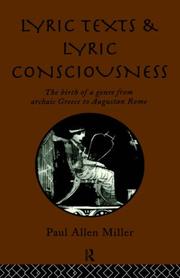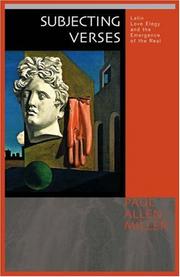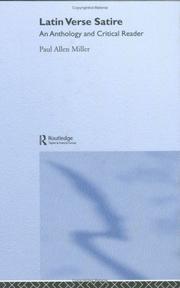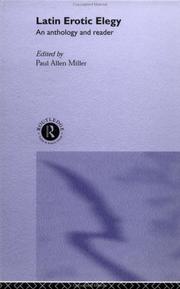| Listing 1 - 10 of 23 | << page >> |
Sort by
|

ISBN: 0415105188 9781317761754 1317761758 9781315800172 1315800179 9781317761730 1317761731 9781317761747 131776174X 0415105196 1138006769 9786612768514 1134846622 1282768514 0203974611 9780415105187 9780203974612 9781134846627 9781282768512 6612768517 Year: 1994 Publisher: London Routledge
Abstract | Keywords | Export | Availability | Bookmark
 Loading...
Loading...Choose an application
- Reference Manager
- EndNote
- RefWorks (Direct export to RefWorks)
Lyric Texts and Lyric Consciousness presents a model for studying the history of lyric as a genre. Prof Miller draws a distinction between the work of the Greek lyrists and the more condensed, personal poetry that we associate with lyric. He then confronts the theoretical issues and presents a sophisticated, Bakhtinian reading of the development of the lyric form from its origins in archaic Greece to the more individualist style of Augustan Rome. This book will appeal to classicists and, since English translations of passages from the ancient authors are provided, to those who special
Poetry --- Classical literature --- Classical poetry --- Lyric poetry --- Poésie ancienne --- Poésie lyrique --- History and criticism --- Histoire et critique --- Latin literature --- Literary form --- History and criticism. --- Greek influences. --- History --- 87-1 --- -Lyric poetry --- -Latin literature --- -Literary form --- -Form, Literary --- Forms, Literary --- Forms of literature --- Genre (Literature) --- Genre, Literary --- Genres, Literary --- Genres of literature --- Literary forms --- Literary genetics --- Literary genres --- Literary types (Genres) --- Literature --- Roman literature --- Classical philology --- Latin philology --- Klassieke literatuur: poëzie --- Greek influences --- -Augustus Emperor of Rome --- -Influence --- Rome --- Civilization --- -Greek influences. --- -Klassieke literatuur: poëzie --- 87-1 Klassieke literatuur: poëzie --- -87-1 Klassieke literatuur: poëzie --- Form, Literary --- Poésie ancienne --- Poésie lyrique --- Augustus, --- Octavius Caesar, --- Gaius Octavius, --- Octavius, Gaius, --- Octavianus, --- Octavianus, Gaius Julius Caesar, --- Gaius Julius Caesar Octavianus, --- Octavian, --- Caius Julius Caesar Octavianus, --- T︠S︡ezarʹ Oktavian Avgust, --- Oktavian-Avgust, T︠S︡ezarʹ, --- Avgust, T︠S︡ezarʹ Oktavian, --- Octavianus Augustus, --- Augusto, --- Cesarz August, --- Ogusṭus, --- Augustus Caesar, --- Gaius Octavius Thurinus, --- Octavio Augusto, --- Cayo Octavio Turino, --- Thurinus, Gaius Octavius, --- Turino, Cayo Octavio, --- אוגוסטוס --- Influence. --- Greece --- Classical poetry - History and criticism. --- Lyric poetry - History and criticism. --- Latin literature - Greek influences. --- Literary form - History - To 1500.

ISBN: 0691096740 9786612087806 1282087800 1400825938 9781400825936 9780691096742 Year: 2004 Publisher: Princeton (N.J.): Princeton university press
Abstract | Keywords | Export | Availability | Bookmark
 Loading...
Loading...Choose an application
- Reference Manager
- EndNote
- RefWorks (Direct export to RefWorks)
The elegy flared into existence, commanded the cultural stage for several decades, then went extinct. This book accounts for the swift rise and sudden decline of a genre whose life span was incredibly brief relative to its impact. Examining every major poet from Catullus to Ovid, Subjecting Verses presents the first comprehensive history of Latin erotic elegy since Georg Luck's. Paul Allen Miller harmoniously weds close readings of the poetry with insights from theoreticians as diverse as Jameson, Foucault, Lacan, and Zizek. In welcome contrast to previous, thematic studies of elegy--efforts that have become bogged down in determining whether particular themes and poets were pro- or anti-Augustan--Miller offers a new, "symptomatic" history. He asks two obvious but rarely posed questions: what historical conditions were necessary to produce elegy, and what provoked its decline? Ultimately, he argues that elegiac poetry arose from a fundamental split in the nature of subjectivity that occurred in the late first century--a split symptomatic of the historical changes taking place at the time. Subjecting Verses is a major interpretive feat whose influence will reach across classics and literary studies. Linking the rise of elegy with changes in how Romans imagined themselves within a rapidly changing society, it offers a new model of literary theory that neither reduces the poems to a reflection of their context nor examines them in a vacuum.
Littérature réaliste --- Neorealism (Literature) --- Neorealisme (Literatuur) --- Néoréalisme (Littérature) --- Realism (Literary movement) --- Realism in literature --- Realisme (Letterkundige beweging) --- Realisme (Literaire beweging) --- Realisme in de literatuur --- Realistische literatuur --- Réalisme (Mouvement littéraire) --- Réalisme dans la littérature --- Seksualiteit in de literatuur --- Sex in literature --- Sexe dans la littérature --- Elegiac poetry, Latin --- Erotic poetry, Latin --- Realism in literature. --- Sex in literature. --- Poésie élégiaque latine --- Poésie érotique latine --- Sexualité dans la littérature --- History and criticism. --- Histoire et critique --- Poésie élégiaque latine --- Poésie érotique latine --- Réalisme dans la littérature --- Sexualité dans la littérature --- Magic realism (Literature) --- Mimesis in literature --- History and criticism --- Elegiac poetry [Latin ] --- Erotic poetry [Latin ]

ISBN: 0415317169 0415317150 9780415317160 9780415317153 Year: 2005 Publisher: London Routledge
Abstract | Keywords | Export | Availability | Bookmark
 Loading...
Loading...Choose an application
- Reference Manager
- EndNote
- RefWorks (Direct export to RefWorks)
Verse satire, Latin --- Verse satire, Latin. --- History and criticism. --- Latin verse satire --- Latin poetry --- History and criticism --- Verse satire, Latin - History and criticism

ISBN: 0415243718 0415243726 Year: 2002 Publisher: London : Routledge,
Abstract | Keywords | Export | Availability | Bookmark
 Loading...
Loading...Choose an application
- Reference Manager
- EndNote
- RefWorks (Direct export to RefWorks)
Elegiac poetry, Latin --- Erotic poetry, Latin --- Love poetry, Latin --- Poésie élégiaque latine --- Poésie érotique latine --- Poésie d'amour latine --- History and criticism --- Histoire et critique --- Elegiac poetry, Latin. --- Erotic poetry, Latin. --- Love poetry, Latin. --- History and criticism. --- Poésie élégiaque latine --- Poésie érotique latine --- Poésie d'amour latine --- Latin love poetry --- Latin poetry --- Latin erotic poetry --- Latin elegiac poetry
Book
ISBN: 9781784533304 1784533300 9781784533298 1784533297 9781786735386 9781786725387 178672538X 1786735660 1788318986 Year: 2019 Publisher: London I.B.Tauris & Co. Ltd
Abstract | Keywords | Export | Availability | Bookmark
 Loading...
Loading...Choose an application
- Reference Manager
- EndNote
- RefWorks (Direct export to RefWorks)
Horace --- Gorat︠s︡īĭ --- Gorat︠s︡iĭ Flakk, Kvint --- Horacij --- Horacio, --- Horacio Flaco, Q. --- Horacjusz --- Horacjusz Flakkus, Kwintus --- Horacy --- Horatius Flaccus, Quintus --- Horaṭiyos --- Horaṭiyus --- Horats --- Horaz --- Khorat︠s︡iĭ --- Khorat︠s︡iĭ Flak, Kvint --- Orazio --- Orazio Flacco, Quinto --- הוראציוס --- הורטיוס --- Criticism and interpretation. --- Horatius Flaccus, Q. --- Horacij Flakk, Kvint
Book
ISBN: 9780199640201 9780199640218 Year: 2019 Publisher: Oxford Oxford University Press
Abstract | Keywords | Export | Availability | Bookmark
 Loading...
Loading...Choose an application
- Reference Manager
- EndNote
- RefWorks (Direct export to RefWorks)
Philosophy --- Sociology of the family. Sociology of sexuality --- Plato --- France
Book
ISBN: 135025259X 9781350252592 Year: 2023 Publisher: London : Bloomsbury Academic,
Abstract | Keywords | Export | Availability | Bookmark
 Loading...
Loading...Choose an application
- Reference Manager
- EndNote
- RefWorks (Direct export to RefWorks)
Book
ISBN: 1643360582 1643360590 Year: 2019 Publisher: Columbia, South Carolina : University of South Carolina Press,
Abstract | Keywords | Export | Availability | Bookmark
 Loading...
Loading...Choose an application
- Reference Manager
- EndNote
- RefWorks (Direct export to RefWorks)
"The present book in both its topic and its transnational makeup has come at a very particular moment. A few short years ago, globalism seemed to be both a known and an inexorable phenomenon. With the end of the Cold War, the opening of the Chinese economy, and the ascendancy of digital technology, the prospect of a unified flow of goods and services, of people and ideas seemed unstoppable (Moraru). Political theorists such as Francis Fukuyama proclaimed "the end of history." Yes, there were pockets of resistance and reaction, but these, we were told, would be swept away in a relentless tide of free markets and global integration that would bring Hollywood, digital finance, and fast food to all. Religious fundamentalism, revanchist forms of nationalism, attachments to traditional sexual identities would melt away before the forces of what were variously termed "modernity," "postmodernity," and Empire. A kind of relentless, technocratic rationality would sweep all in its wake, bringing a neoliberal utopia of free markets, free speech, and ever-increasing productivity. Were there, in the words of a seventies classic, "limits to growth" (Meadows et al.)? If so, they would be either transcended or accommodated by the same forces that threatened their breach. Climate change would be managed through a combination of technological innovation and agreed-upon regulation. Population control would be achieved by education, prosperity, and women entering the workforce"--
Book
ISBN: 9781474278669 Year: 2022 Publisher: London Bloomsbury Academic
Abstract | Keywords | Export | Availability | Bookmark
 Loading...
Loading...Choose an application
- Reference Manager
- EndNote
- RefWorks (Direct export to RefWorks)
Book
Year: 2007 Publisher: Columbus : Ohio State University Press,
Abstract | Keywords | Export | Availability | Bookmark
 Loading...
Loading...Choose an application
- Reference Manager
- EndNote
- RefWorks (Direct export to RefWorks)
Foucault, Michel, --- Derrida, Jacques. --- Lacan, Jacques, --- Plato --- Influence. --- France --- Intellectual life
| Listing 1 - 10 of 23 | << page >> |
Sort by
|

 Search
Search Feedback
Feedback About UniCat
About UniCat  Help
Help News
News